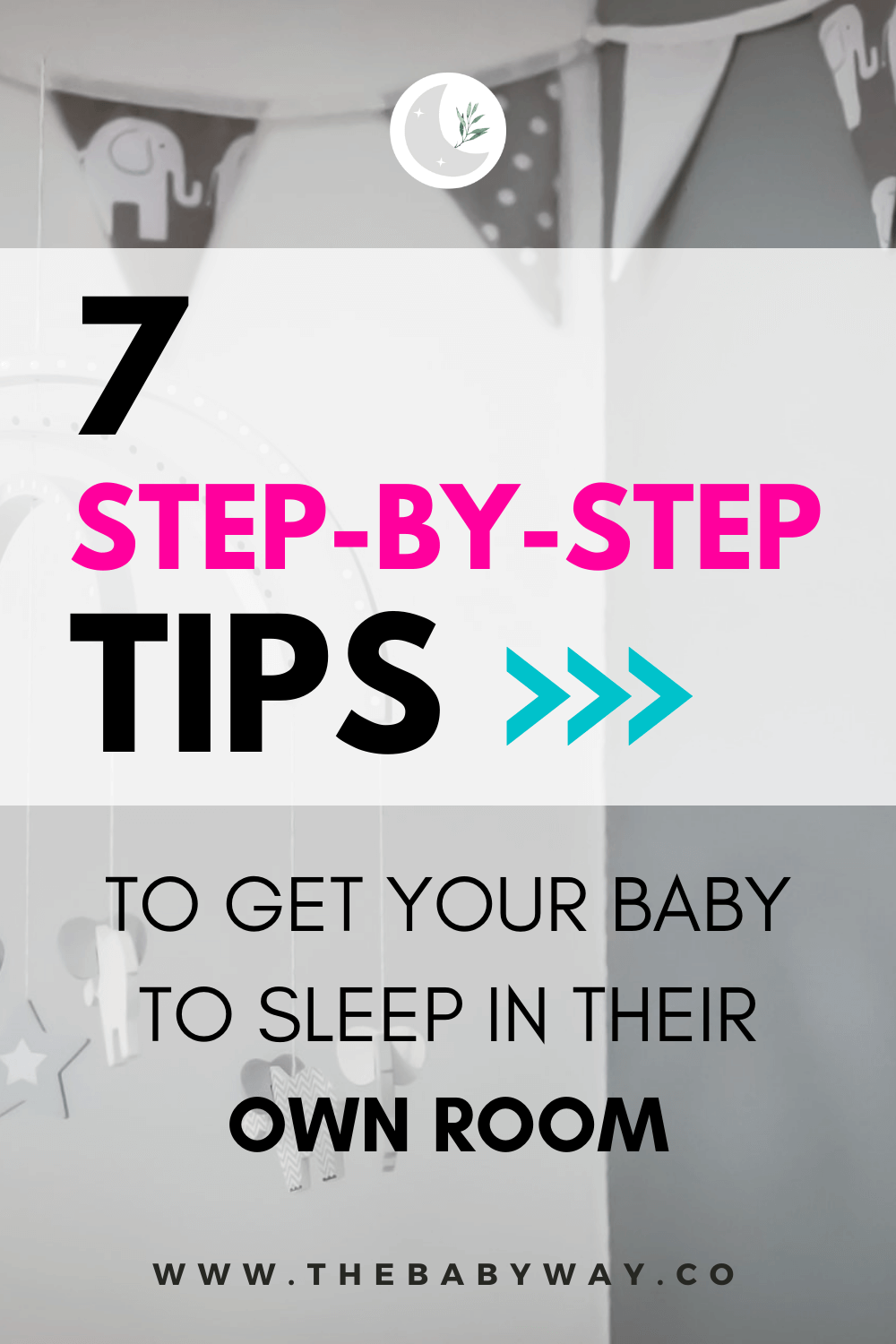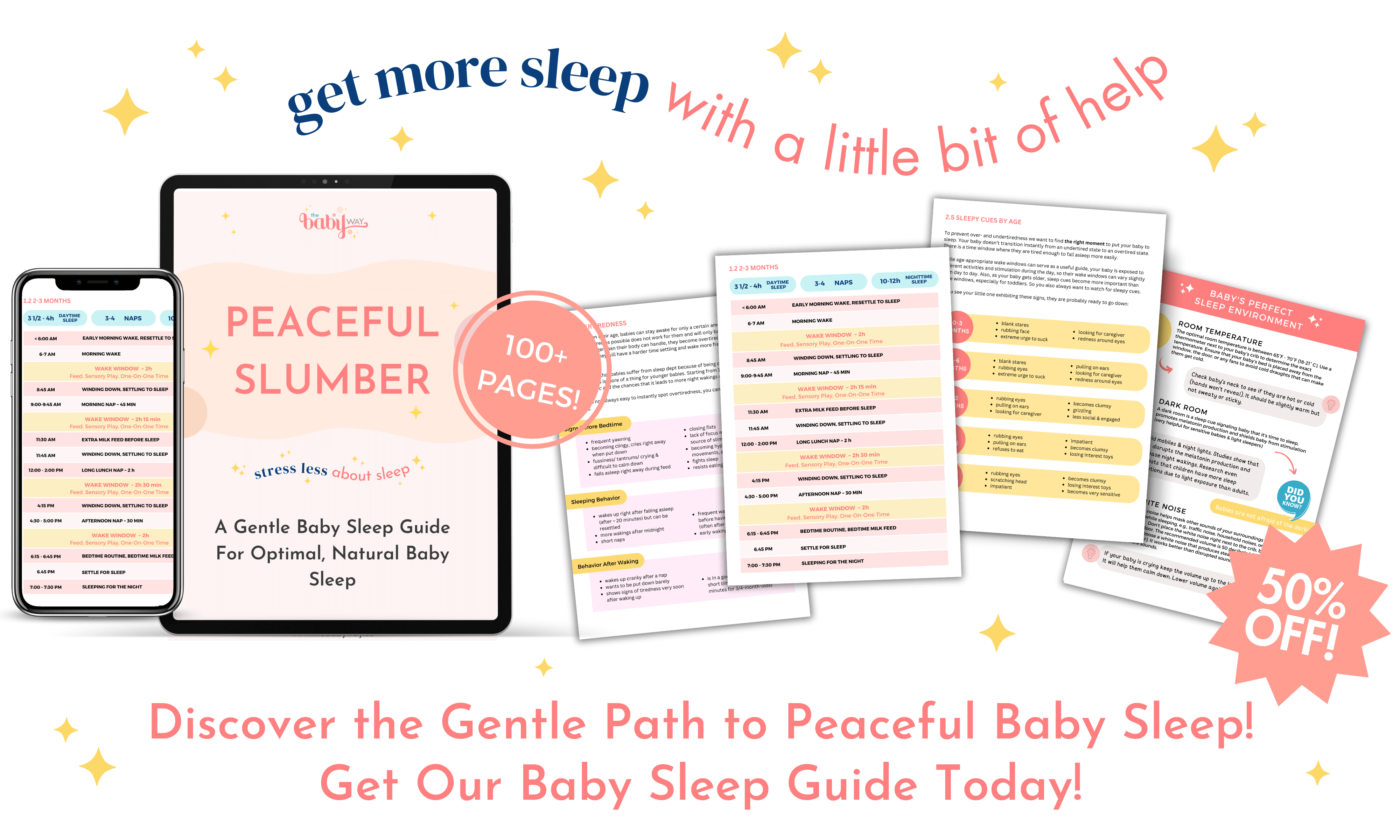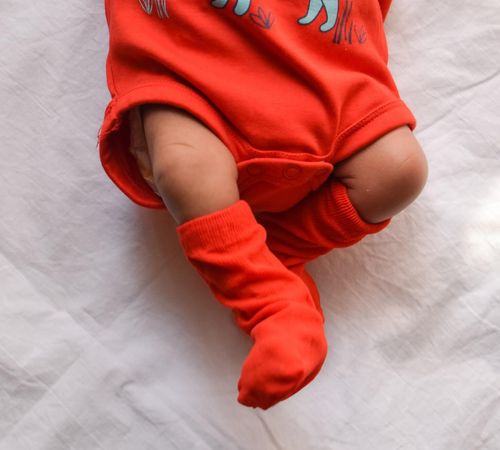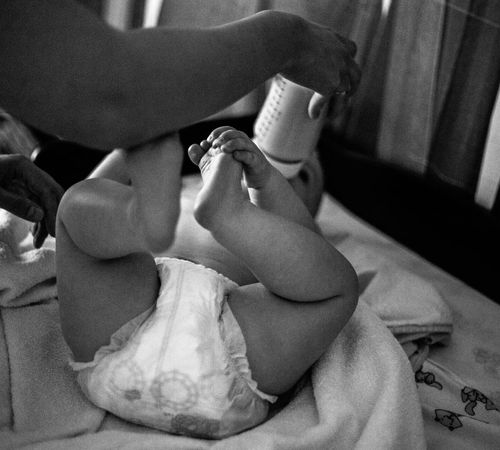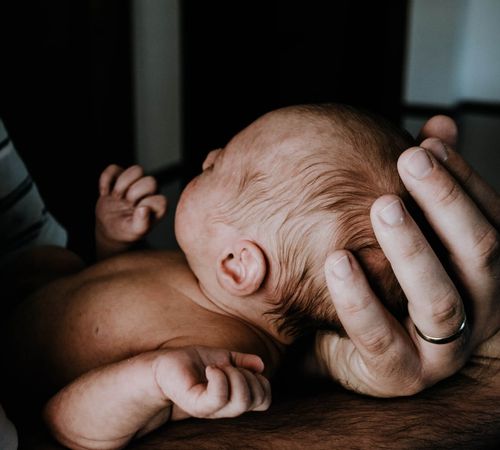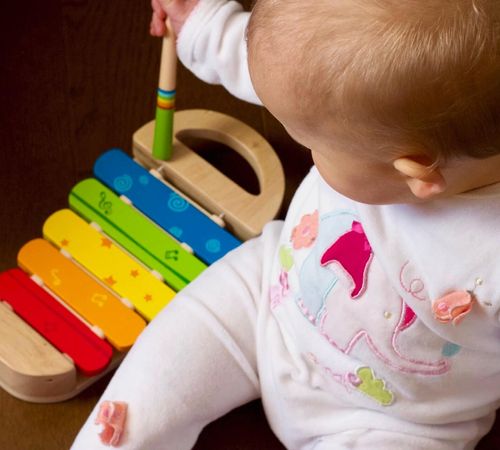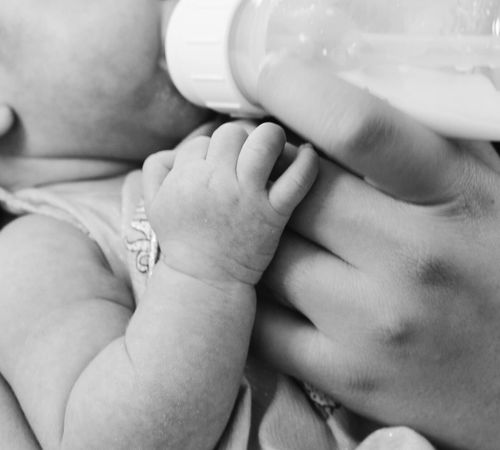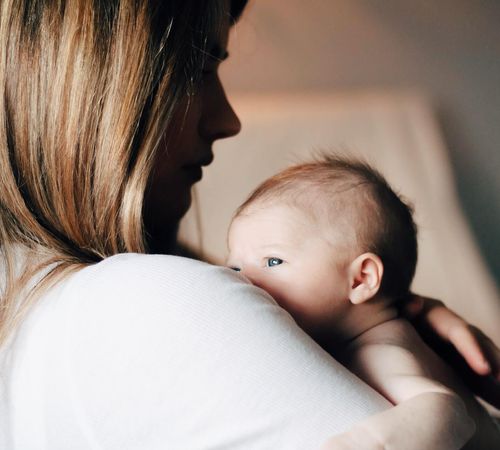Moving your baby to their own room doesn't have to be stressful or filled with tears. Learn when it's the best time to move your baby and how to make the transition as easy as possible with our 10 proven tips that work!
Having your baby sleep next to you in the same room can give you two emotions:
Either you love it, or you are over it.
Some parents prefer having their baby sleep in their bedroom. It gives them a source of comfort knowing their baby is sleeping right next to them. It can also make night feedings easier because you don't have to get up and go to another room to feed the baby. They sleep better with their baby in the same room.
But there are also parents who sleep worse when their baby is sleeping in the same room. Maybe they are very light sleepers and wake up at every little movement their baby makes. Or their baby is a very light sleeper and wakes up at every little noise. I remember I couldn't go to the bathroom at night because the minute I put my foot on the ground, my baby girl would wake up.
So maybe you are at a point right now where you want to move your little one into a separate room. But you don't know if your baby is ready or how to approach this.
So in this article, we will cover when it is the best time to transition your baby to their own room, how to know if they are ready and how to get this going as smoothly as possible.
This article covers:
When To Move Baby To Their Own Room
There is no right or wrong time to move your baby. It always comes down to the same thing: your personal situation as a family.
But sharing a room with your new baby for the first few months can be beneficial. The American Academy of Pediatrics recommends room sharing for the first 6 months, ideally until a baby's first birthday, to reduce the risks of Sudden Infant Death Syndrome (SIDS). When a caretaker is sleeping close by the baby, they can much faster react to potentially dangerous situations. Babies, especially newborn babies, also tend to arouse more easily from sleep and spend less time in deep sleep when their parent sleeps next to them, which is also a protective mechanism to prevent sleep related infant death.
Choosing a sleeping arrangement is a personal family matter.
That said, the sleeping arrangements of a family are a personal matter. Whatever your reasons are for considering moving your baby, they are absolutely valid. You can always give it a try when you feel ready for it.
Sometimes as parents, we are afraid to try something new because we don't know how our children might react. And your baby may not instantly like sleeping in a new room. But you will never know until you try it out, and often our children will surprise us. They are usually not as complicated as we think. You know how often I moved the crib from our bedroom into the nursery in the morning only to move it back in the evening? I'm pretty sure my little one thought I was crazy. That's how much we sometimes overthink as parents.
Do Babies Even Sleep Better In Their Own Room?
There is no guarantee that a baby will sleep better in their own room. It really varies from child to child.
Light sleepers sometimes sleep better in their own room. However, high-need children or highly sensitive babies might sleep worse in a separate room. The only way to find out is to give it a try.
My big girl started to sleep in her own room at 14 months. She was a very light sleeper, so I decided to give it a try. She instantly slept better from the very first night. I was even still feeding her at night. So we went from 3 to 1 night feeding without doing anything, and I completely weaned at 16 months.
My boy, on the other hand, slept very poorly when he was alone. I moved him to his own room at 13 months, and even though we had no night feedings, he would wake multiple times a night. It was really tiring. Even though he would often fall back asleep on his own and I didn't have to go over, just hearing him would wake me every time. So we moved in back together and slept happily together until he was 2 years old (and he slept through the night without a beep).
I always suggest giving it 1-2 weeks. If things don't get better, then it's no big deal to switch back to your old sleeping arrangement. You can try again another time.
How to Tell If Baby Is Ready for Their Own Room
If your baby is younger than six months, they ideally should be ready to roll back from back to tummy. If you are still swaddling your baby and they are close to turning from back to tummy, you want to switch to a sleeping bag for safety reasons.
If you are still feeding your baby at night, having a baby sleep in their parent's room often makes things easier. I personally always suggest waiting until you are down to two night feedings before moving baby out. Always consider baby's age and the normal amount of feedings at night. Don't force weaning only in order to move them out.
But if your baby is waking several times at night, it does not necessarily mean they are not ready. As mentioned before, some babies are light sleepers. Your baby might still be ready for the move. Choose a room nearby so you can attend to them easily when they need you.
If your baby or child is going through a sleep regression or separation anxiety, you might wait a little bit longer until things calm down.
Another thing to consider is that babies may have an easier time adjusting the younger they are. Older babies become very alert to their surroundings. The process of getting used to a new room can take a bit more time.
And if you have a toddler, then this is what you should know: you don't have to move your child out of your bedroom because you think they are getting too old to sleep in your room. Toddlers actually really sleep very well in their parents' room, and so do most parents. So if that's what's pressuring you, then don't let it pressure you. Keep things the way they are as long as it works for you.
If, however, you are ready for a transition, then your toddler will always be ready. It is more about when you are ready to set the boundary. But you should know that sometimes toddlers or younger children (3 years and older) might come over more often at night (which is completely normal). At this age, they develop their first fears. So don't be frustrated about that and give them time.
How To Move Baby To Their Own Room Without Tears - 10 Helpful Tips
*Before moving your baby to their room, make sure you prepare everything for safe sleep and follow safe sleep guidelines.*
1. Get Baby Used To The Room During The Day
Before you move your baby into their room, make sure they are familiar with it. Make it a happy place for your baby. This is the very first step before you transition your little one. Use their room more intensively. Play there during the day and create positive associations.
2. Bedtime Routine In The New Room
Once your little one gets used to the new room, start having their bedtime routine there. Make sure you finish off your routine with a book. It's a perfect way to get some more relaxing bonding time before bed. Then let your baby sleep in your bedroom as usual.
3. Introduce Passive Sleep Associations
If you are not already using passive sleep associations, then this is a good time to start (it's never too late to start). Passive sleep associations are things that will signal your baby that it's time to sleep without your active help. For example, white noise, a sleep sack, and a dark room are helpful sleep associations.
To get your baby used to those new sleep associations, start using them every night while they still sleep in your bedroom. Babies usually get used to them quite fast. Also, make sure to prep their new sleep space with blackout curtains to keep any unwanted light out, which might disrupt their sleep. Having those familiar sleep associations in baby's new room can make them sleep better.
4. Get The New Crib Before Moving Your Baby Out
If you plan on transitioning your baby from bassinet to crib, you might want to do that before you move your baby to their own room. A bed transition usually goes much smoother in a familiar sleep environment. Your baby will get used to the new crib much easier when they are still sleeping in your room.
Once they get used to it, you can move it with you, which will make the room transition also easier because they are taking their familiar sleeping space with them.
5. Stay Consistent
Going back to old habits is often easy. But it will also prevent you from having the success you want. It is perfectly normal if your baby is protesting the first few days or their nighttime sleep gets more disrupted than usual. Many babies wake more often during the first few nights.
Just because they sleep worse in the beginning, doesn't mean it will not work. They need time to adjust, so it's important that you stay consistent. If you keep switching back and forth between your sleep arrangements, you will only confuse them. So try to be patient and be there for them during the whole process.
6. Don't Stress Or Assume The Worst
Babies have super-receptors when it comes to parental stress. My girl can detect my stress levels while I am at home and she is at kindergarten. The distance does not stop those receptors.
Whenever their parent is stressed, babies get stressed. I know it can be challenging if the transition is not going super smooth. But remind yourself that it is a process. They will pick up on your stress, making the transition harder for both of you. Repeat over and over again in your head that it is not easy for your baby to adjust to a new sleeping environment and that they need you to be there for them.
7. Plan More Time To Fall Asleep
I remember how surprised my kids looked the first time they were supposed to sleep in their new room. I put them into their crib, and they looked at me like, "what is happening here?". It was funny and scary at the same time.
Your baby will not know what is going on the first few nights. They might need more time to settle to sleep. So make sure to prepare for bed a little bit earlier. Taking 30 minutes to fall asleep is very normal. Everything under 20 minutes is actually really fast.
You also want to prevent your baby from getting overtired. Otherwise, they will have a really hard time falling asleep.
8. Stay In The Room For The First Couple Of Nights
It's absolutely no problem to stay with your baby in their room for the first few nights. It might make the transition for both of you easier.
Place a mattress on the floor near their crib so you can easily comfort them when they wake up during the night. You can later use a baby monitor to keep an eye on your little one.
9. Buy A Big Kid Bed
Toddler beds to the rescue! If you are moving out your toddler, a new bed can be a real hit. Children get super excited when they get a bigger bed. Announce that the new room comes with a cool new toddler bed and maybe a new stuffed animal.
10. On Moving Day, Start With Naps Or Bedtime?
That really depends on your child. If your baby goes down easily in the evening, start with bedtime and follow up with naps the next day. Sleep pressure is high in the evening, and your baby might be less distracted by the new room.
However, if bedtime is a struggle or your baby takes a long time to fall asleep, start with the first nap of the day (morning or lunch nap). Morning naps are usually easy to achieve. And if the nap doesn't go as planned, you can still have an earlier bedtime.
Either way, chances are you are going to lose some sleep yourself. ;)
Conclusion
I know there is a lot of pressure on parents that they HAVE to move their kids into their own rooms to promote independent sleep. Otherwise, they might still want to sleep with you in your bedroom until all eternity.
But the truth is that room sharing works perfectly for many families, and if it does for yours, then there is absolutely no pressure to move your baby out of the bedroom as fast as possible. I actually enjoyed having them in my room and bed as they got older. The irony, huh?
But you also might want to have your bedroom to yourself again. Then you should claim that right as well.
Just remember one thing: Whatever you choose to do, it is your decision to make, and you should make it on your terms.
